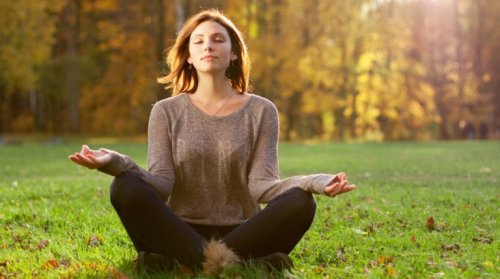Five Advantages of Going on a Meditation Retreat

How much time do you dedicate exclusively to yourself? Most people would answer that they don’t dedicate any time to themselves. Sometimes, we dedicate our time and life to things that are more distracting than enjoyable. That’s why it’s so important to go on a meditation retreat from time to time.
A meditation retreat consists of withdrawing from your usual world. People use them to think about themselves and their lives. During retreats, people tend to reflect a lot to get to know themselves better and evaluate how they feel.
Ideally, meditation retreats should last at least one full day. Likewise, you should do it in solitude. Choose a place where you can be at peace and feel comfortable.
Here are five advantages of going on a meditation retreat.
“You can ask others for directions about your life’s path… But remember, then you’re on someone else’s journey and may get lost.”
-Nanette Mathews-
Solitude eradicates many excuses
We spend a lot of our time surrounded by other people. Therefore, we focus on the interactions we have with them. Likewise, we collect thoughts about others: what they tell us, how they see us, how they respond to us, etc. In summary, we focus on the outside.
In a meditation retreat, these external stimuli disappear because we distance ourselves from others. We’re left alone with ourselves. This can be uncomfortable for some people and even lead to feelings of abandonment or helplessness. However, by concentrating on what we’re going to do, that feeling disappears. Little by little, we delve into our inner self and give ourselves the opportunity to adopt a different perspective.

Taking a step back gives you another perspective
By separating ourselves a little from our daily reality, we change our perspective. Meditation retreats allow us to see the whole picture. Many of the details vanish, but the entire map becomes clearer.
In these conditions, we have the opportunity to find ourselves. Meditation retreats allow us to see if we’re where we want to be or if we’re very far from that place. They also allow us to synchronize our emotions. This way, we’ll get to see the whole picture in a more objective way.

Disconnection: A great advantage of a meditation retreat
To disconnect means to make a temporary break from technology and our routine. From time to time, the brain needs a break from external stimuli.
When you disconnect, you give the brain the opportunity to reorganize itself slowly. You also facilitate a state of relaxation and serenity. This means slowing down and giving yourself time to take in your feelings, thoughts, and emotions. Undoubtedly, this will make you feel calmer and with a greater sense of control.
Reactivate repressed emotions
Just as there are some emotions that become less intense during a meditation retreat, other subjective realities such as repressed feelings and emotions tend to come to the surface.
When you invest time in yourself, you allow your real self to express itself. That’s why, without knowing it, memories that you thought you’d forgotten come to mind. This is because your voice doesn’t have to compete with others during a meditation retreat.
Rest
Rest is not about being inactive or saturating yourself with distractions. You don’t really rest if your mind can’t get away from daily worries and replace them with creative and/or liberating exercises. In fact, psychological fatigue is much stronger than physical fatigue. Therefore, more than resting your body, real rest drains your emotions.

In conclusion, it’s very advisable to go on a meditation retreat a few days a year. Meditating is all about calming down and contemplating. It’s a self-gift that shows we love and care about ourselves.
This text is provided for informational purposes only and does not replace consultation with a professional. If in doubt, consult your specialist.








